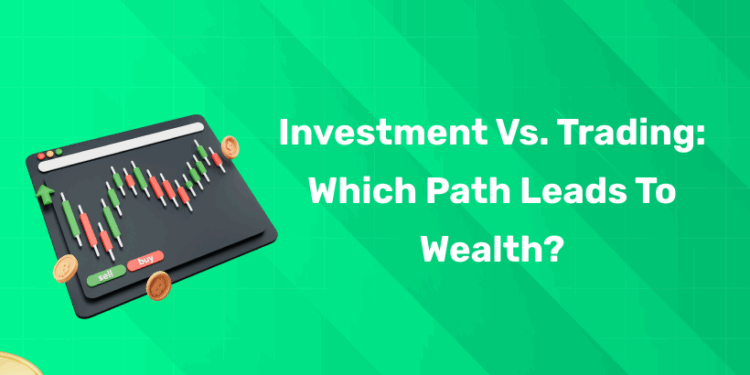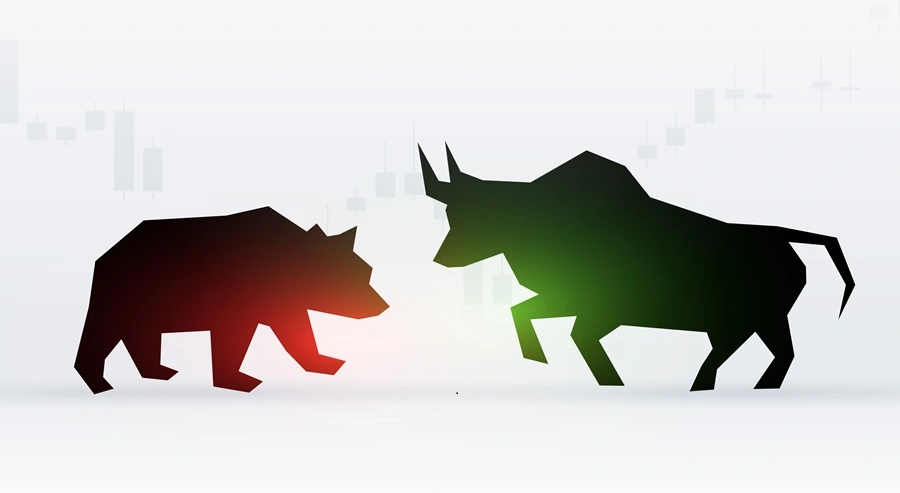Table of Contents
Investing and trading are the two wealth-generating methods in the realm of finance. Although they both entail operating in the markets, their strategies, timelines, and requisite attributes for success are essentially diverse.
This blog post is for you if you’ve ever puzzled whether you should be a keen investor who seeks earnings from immediate market changes or a passive owner of reputable companies. By helping you in choosing the best possible option for your financial pursuit, we go over the core concepts, perks, and challenges of each of them.
Learn Stock Marketing with a Share Trading Expert! Explore Here!
The Philosophy of Investing: Becoming a Business Owner
A strategic vision is extremely important while investing. When you invest, you acquire a fractional share of ownership in an actual enterprise that is not merely an ownership sign. Your objective is to enable your capital to be multiplied over a prolonged period by the power of compounding and the underlying growth of the firm.
The Focus of a True Investor
A good investor concentrates on the company’s core principles rather than the daily clamor of the market. Significant areas of specialization comprise of:
- The Business Model: Whether the company solve a real problem and does it have a scalable and profitable business model?
- Owners/Management Quality: The expertise and ethics of the individuals in charge of the business are fundamental. Poor management could lead to an exceptional business to collapse, but effective leadership may guide it through challenging times.
- Consistent Growth: Investors look for companies that may boost their profits and sales over a decade or beyond, which indicate there is an increasing need for their products and services.
- Economic Moat: The company’s long-term earnings and market share are shielded from adversaries by its economic moat, which is a sustainable competitive advantage (e.g., strong branding, price advantage, and network impact).
Direct and Indirect Benefits of Investing
There are greater advantages to investing over the long run besides just observing the share price appreciate. The most evident gain is appreciation in capital, which increases the value of your holding when a firm expands and generates greater revenues, and solidifies its authority in the market.
Furthermore, many companies offer a percentage of their profits to investors through dividends, which are typically paid on a quarterly or annual basis and can be retained to increase long-term compounding or offer an ongoing source of passive earnings. Then there are bonus issues and stock splits, which increase the amount of shares you own without enabling you to make any additional investments.
While bonuses offer you additional complimentary shares from the company’s reserve fund, typically indicating solid financial health and managerial assurance, stock splits divide each share into multiple shares, rendering the stock more affordable and frequently improving liquidity. When evaluated as an ensemble, these direct and indirect advantages demonstrate that the real potential of investment rests not only in short-term price changes but also in the various ways that wealth gradually accumulates.
Market Cycles and Investment Shift
The business and capital panorama changes in tandem with the evolution of technology (from CRT television screens to LCD screens, then LED displays). The most advantageous industries or businesses that are worth investing in change throughout the term due to market cycles and conditions.
A wise investor detects these alterations and places their holdings in companies that are likely to take over the following cycle, always keeping an eye on the future that puts the company’s expansion and longevity ahead of its immediate earnings.
The Strategy of Trading: Profiting from Price Movements
1: What is a stock?
Contrarily, trading is a far more dynamic and transient activity. In order to benefit from the difference between buying and selling prices over times ranging from minutes (day trading) to a few weeks (swing trading), a trader focuses on reaping the benefits of the market’s inefficiencies and volatility rather than owning a business.
The key objective of trading is to preserve your financial well-being, which begins with stringent risk management. This includes establishing unambiguous stop-loss levels and striving for an optimal risk-to-reward ratio to prevent one poor trade from knocking out the profits generated by several profitable ones. Mastering trading psychology is equally essential because fear and greed frequently prompt traders to terminate lucrative transactions prematurely or dwell on missed trades for a prolonged period. Whether it’s a bullish uptrend, a negative downtrend, or a sideways consolidation phase where many would prefer to remain cautious or switch to range-based methods, successful traders learn to “go with the flow,” matching their trades with the general direction of the market.
Common Trading Mistakes
A large percentage of retail traders collapse as they fall into a few typical pitfalls: they trade impulsively, fueled by impatience, FOMO, or retaliation after a loss; they operate without a solid strategy, placing trades without clear entry points, stop-loss levels, or revenue targets; they excessively leverage by taking excessive risk with borrowed money in their expectation of quick profits; and they ignore risk management by avoiding stop-losses and obstinately holding losing trades.
A Side-by-Side Comparison & Conclusion
A trader works on much shorter timeframes, ranging from minutes to weeks, relying on price swings, graphs, and indicators of trend, whereas an investor envisions long-term, often for years or decades, focusing on business fundamentals, company competence, growth potential, and competitive moat. While an investor encounters abrupt and unforeseen price volatility, the investor’s principal risk is that the underlying firm deteriorates over time. While traders require discipline, stringent risk management, and technical analysis, investors thrive on patience, research, and solid fundamental analysis. Additionally, there are significant differences in activity levels: traders make frequent trades during the day or week, whereas investors occasionally purchase or sell.
Learn Stock Marketing with a Share Trading Expert! Explore Here!
Which Is Better for You?
“Which is better, trading or investing?” doesn’t have a single perfect answer; however, it is contingent upon your goals, personality, and available time. Investing is the better choice for most people who desire consistent wealth growth if they have an eye toward the future, don’t want to spend their days glancing at charts, want fewer pressures, and are convinced of the power of compounding through managing solid businesses.
Conversely, trading can be an appropriate match for you if you have the time to closely track the markets, remain highly conscientious, have a good handle on emotions, and can commit to working hard to comprehend, evaluate, and optimize a structured strategy. Many people find that a balanced strategy works best: invest the majority of your money for the long term and use a small portion ( 5–10%) for active trading if you’re interested and can tolerate the risk. The most important thing to do is to just start your financial journey, whether you want to be a disciplined market participant or a patient long-term owner.
Stock Market Training Reviewed & Monitored by SEBI Registered RA
Trusted, concepts to help you grow with confidence. Enroll now and learn to start investing the right way.
Know moreFrequently Asked Questions
What is the main difference between investment and trading?
Investment focuses on long-term wealth creation, while trading involves short-term buying and selling for quick profits.
Which is better for beginners: investing or trading?
Beginners often benefit more from investing because it’s safer, easier to manage, and requires less technical knowledge.
Can trading make you rich quickly?
Trading can generate fast profits, but it also involves high risk and requires strong market skills and discipline.
Is investing safer than trading?
Yes. Investing in diversified, long-term assets generally carries lower risk than active trading.
Do I need high capital for trading?
Not necessarily, but traders often need more capital to handle losses, margin requirements, and market volatility.













